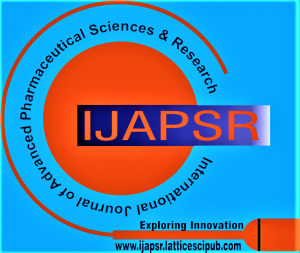![]()
Management of Hypertension: Clinical Relevance and Perspective
Rashi Bandey1, Anupa Bhagat2, Hari Prasad Sonwani3, Aaftab4, Pragati5
1Rashi Bandey, Department of Pharmacology, Apollo College of Pharmacy, Anjora Durg (C.G), India.
2Anupa Bhagat, Department of Pharmacology, Apollo College of Pharmacy, Anjora Durg (C.G.), India.
3Hari Prasad Sonwani, Department of Pharmacology, Apollo College of Pharmacy, Anjora Durg (C.G), India.
4Aaftab, Department of Pharmacology, Apollo College of Pharmacy, Anjora Durg (C.G), India.
5Pragati, Department of Pharmacology, Apollo College of Pharmacy, Anjora Durg (C.G), India.
Manuscript received on 15 February 2023 | Revised Manuscript received on 08 March 2023 | Manuscript Accepted on 15 April 2023 | Manuscript published on 30 April 2023 | PP: 29-36 | Volume-3 Issue-3, April 2023 | Retrieval Number: 100.1/ijapsr.C403804030424 | DOI: 10.54105/ijapsr.C4038.03030423
Open Access | Editorial and Publishing Policies | Cite | Indexing and Abstracting
© The Authors. Published by Lattice Science Publication (LSP). This is an open-access article under the CC-BY-NC-ND license (http://creativecommons.org/licenses/by-nc-nd/4.0/)
Abstract: Hypertension, sometimes referred to as the “silent killer,” is a serious and global public health issue. This review article provides an in-depth examination of the epidemiology, pathophysiology, diagnosis, complications, and therapeutic approaches related to hypertension. We investigate the prevalence of hypertension in various demographic groups, as well as the underlying mechanisms, risk factors, and effects it has on different organ systems. We also review the importance of a precise diagnosis, including methods for measuring blood pressure and established diagnostic standards. We also explore the complex field of hypertension management, which encompasses pharmaceutical interventions, lifestyle modifications, and emerging therapeutic approaches. The purpose of this thorough review is to help healthcare practitioners better understand and treat hypertension. Management of hypertension typically involves a combination of lifestyle modifications and medication. Lifestyle changes may include adopting a healthy diet (such as the DASH diet), regular exercise, maintaining a healthy weight, reducing sodium intake, limiting alcohol consumption, and managing stress. Medications, such as diuretics, ACE inhibitors, angiotensin II receptor blockers (ARBs), beta-blockers, calcium channel blockers, and others, may be prescribed depending on the individual’s blood pressure levels and other medical conditions. Individuals with hypertension need to work closely with their healthcare provider to develop a personalised treatment plan. Hypertension is a significant and costly public health problem. It is a major, but modifiable, contributor to the development of cardiovascular disease. Randomized controlled trials have shown that controlling hypertension reduces the risk of stroke, coronary artery disease, congestive heart failure, end-stage renal disease, peripheral vascular disease, as well as overall mortality. The risk of developing these hypertension-related complications is continuous, starting at a blood pressure level as low as 115/75 mm Hg. Despite the inherent health risks associated with uncontrolled hypertension, elevated blood pressure remains inadequately treated in the majority of patients. This article reviews guidelines for optimal evaluation of hypertension and current therapeutic options available to combat this common yet pervasive disease.
Keywords: Hypertension, High Blood Pressure, Epidemiology, Aetiology, Pathophysiology, Complications, Diagnosis, Management Strategies.
Scope of the Article: Pharmacology
